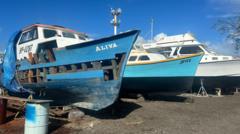In Bridgetown, the temporary boatyard portrays the devastating remnants of Hurricane Beryl's fury, where numerous fishing vessels lie damaged and stranded. Many boats have sustained gaping holes, broken windows, and severed rudders, marking them as fortunate compared to the wreckage of others that sank entirely. The storm severely impacted the fishing fleet, with approximately 75% suffering damage, including 88 boats lost permanently.
Local fishermen are grappling with the long-term effects as they attempt to restore their livelihoods. Charles Carter, owner of a fishing boat named Joyce, has invested time and money in repairs following significant damage. "It's been real bad, I can tell you. Fishing is all I do," he commented, emphasizing the financial strain and disruption he has faced.
Despite some progress six months after the storm, with a few repaired vessels returning to the waters, the broader implications of climate change loom. The islanders are alarmed by shifting sea conditions that complicate their catch, particularly flying fish, a key seafood staple and cultural symbol.
Dr. Shelly Ann Cox, the Chief Fisheries Officer, warns that rising sea temperatures and changing tides are leading to increased challenges for local fishermen. This change is exacerbated by the fact that climate change is producing more intense hurricanes, with Beryl noted as one of the earliest-forming Category 5 storms on record.
The effects on the fishing industry extend into tourism, with restaurants and hotels struggling to secure adequate fish supplies. Some market vendors, like Cornelius Carrington, who lost one of his boats in the storm, are determined to adapt but acknowledge an ongoing struggle to maintain operations.
As Barbadian youth become increasingly engaged in climate change advocacy, a local NGO recently facilitated discussions at Harrison College, igniting debates among students about their futures and the broader implications of climate change. While some students expressed pessimism, others remain hopeful for collaborative efforts that could drive change, echoing sentiments made by Prime Minister Mia Mottley at COP29.
The elderly generation of fishermen, such as Steven Bourne, reflect on the significant changes they've witnessed throughout their lives, including erosion of beaches and alterations in fishing habits. With increasing storm intensity and frequency, the old adage about the hurricane season seems to have lost its meaning.
Bourne, who lost two boats in Beryl, remains resolute; "We love this rock. And we will always be on this rock." Likewise, the islanders hold onto their heritage as their livelihoods and the very landscape of Barbados continue to be challenged by the repercussions of climate change.




















